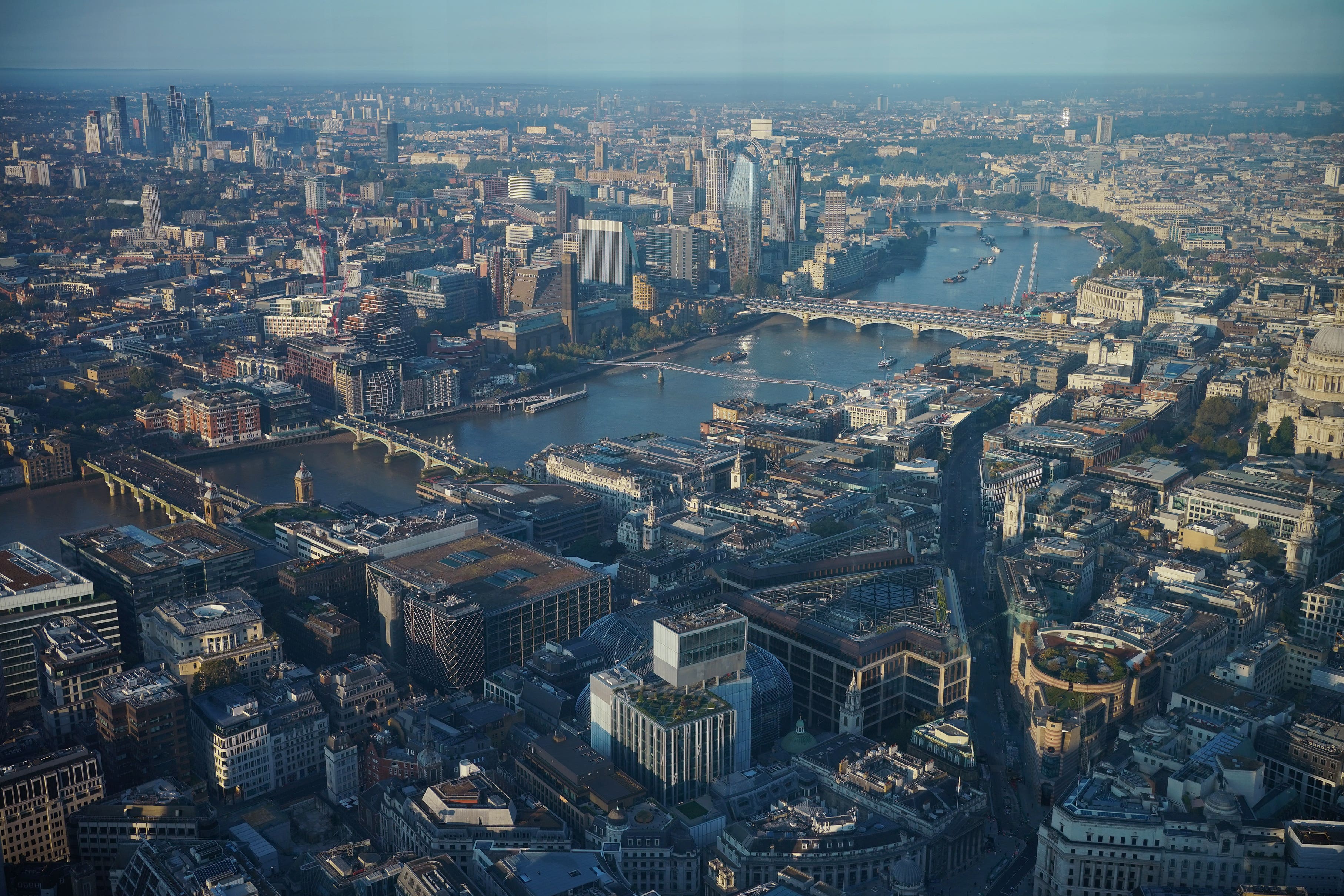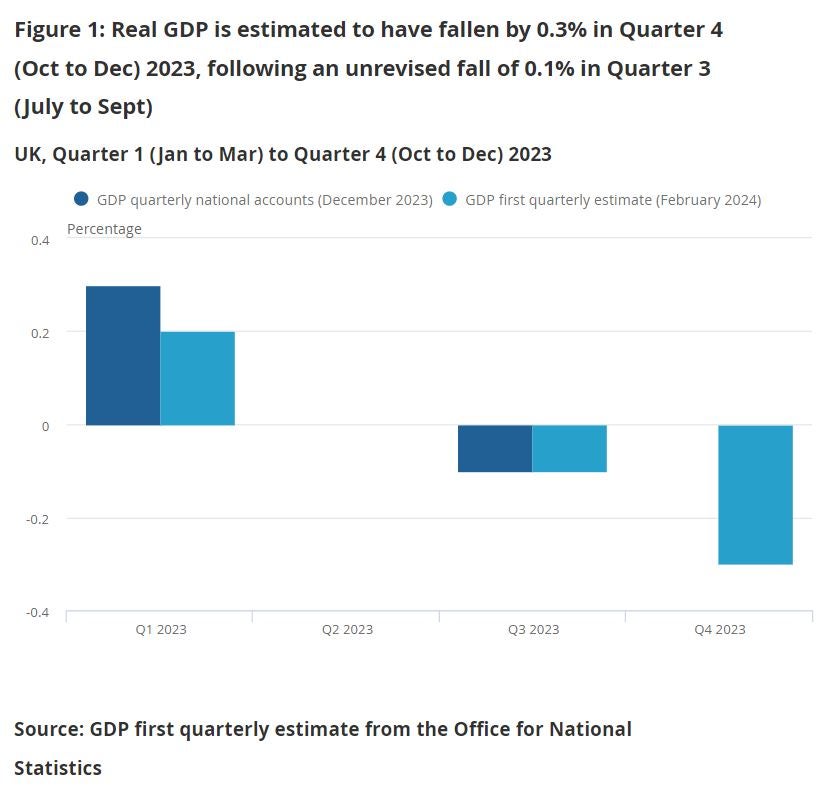What does Britain being in a recession mean?
The UK’s economy stagnated again at the end of 2023, as households feel the strain of higher interest rates
The UK economy has entered its first recession since the start of the Covid pandemic, in a blow to Rishi Sunak’s key pledge to grow the economy.
Gloomy new data published by the Office for National Statistics showed the UK’s gross domestic product (GDP) shrank by 0.3 per cent in the final three months of 2023 – a more severe outcome than the 0.1 per cent contraction forecast by economists.
The output of every main sector in the economy fell in the final quarter of 2023, said Liz McKeown, ONS director of economic statistics, “with manufacturing, construction and wholesale being the biggest drags on growth, partially offset by increases in hotels and rentals of vehicles and machinery”.

Excluding the pandemic-stricken year of 2020, last year marked the weakest year for economic growth since the aftermath of the financial crisis in 2009.
The figures indicate the pressure households are under, with the Bank of England’s decision to hold interest rates at a 14-year high meaning the cost of borrowing and mortgages are still high.
While chancellor Jeremy Hunt insisted the government must “stick to the plan” to cut inflation despite tough times for families, his Labour counterpart Rachel Reeves warned Mr Sunak “can no longer credibly claim that his plan is working” with his promise to grow the economy “now in tatters”.
What is a recession?
A recession is seen as a time when the economy is declining, but there is no globally standardised way of saying exactly how much decline and exactly how long the period has to be.
In the UK, the most generally accepted definition of a recession is two quarters in a row when GDP falls.
But this means that, even if GDP drops by 0.01 per cent one quarter and 0.01 per cent again the next, we are technically in a recession – despite it being far more painful if GDP were instead to shrink by 3 per cent one quarter and rise 1 per cent the next, which would technically not be a recession.

How severe is the current recession?
The fall in Britain’s economic output in the final quarter of 2023 was the biggest drop since the start of 2021, at the height of the pandemic.
But economists have been quick to point out that it is likely to be a recession in the mildest of senses and could prove short-lived, with some insisting it is more accurate to describe the economy as having “stagnated”, after limping along close to zero for much of last year.
There are also signs of resilience elsewhere in the economy, with the jobs market proving robust and wages having outstripped inflation for five months in a row.
However, James Smith of the Resolution Foundation think-tank warned that Britain’s rising population is hiding the impacts of recession, with the economy having failed to grow since early 2022 when accounting for population growth. “The big picture is that Britain remains a stagnation nation, and that there are precious few signs of a recovery that will get the economy out of it,” he said.
And Labour’s shadow chief secretary to the Treasury, Darren Jones, claimed that looking “under the bonnet” of the latest datasets suggests that Mr Sunak has in fact presided over the longest unbroken record of financial decline for families since records began in the 1950s.
What does it mean now we are in a recession?
While a severe recession typically causes unemployment to rise, Britain’s technical recession serves more as an indicator of the pressure households and firms are already under – and as a blow to the government’s promises to boost economic growth.

“Today’s news that the economy entered a technical recession is concerning, but it will not be front of mind for the millions already in unjustifiable hardship,” said the Joseph Rowntree Foundation’s chief economist Alfie Stirling.
“Fridges are either off or empty as already eye-watering food prices continue to rise. Loan and mortgage repayments are being missed as elevated interest rates crush family finances. And jobs are increasingly at risk as the labour market continues to deteriorate.
“Just weeks before the Budget, addressing this crisis of economic security, from individual families to the nation as a whole, must be the first priority for policymakers.”
What does the recession mean for mortgages?
The gloomy economic data is likely to ramp up pressure on the Bank of England to start cutting interest rates from their 14-year high of 5.25 per cent, given the threat to the wider economy from painfully high borrowing costs.
But despite any cut to the Bank’s base rate being eagerly eyed by homeowners, who have been left paying thousands more for their mortgage as rates have soared from just 0.1 per cent in 2020, analysts are uncertain over whether this will come before the summer.

Inflation is still double the Bank’s 2 per cent target, meaning the central bank will want to ensure it continues to head lower before bringing rates down.
ING experts are not predicting a cut until August, while others think it could come in May or June.
When has the UK been in recession before?
The UK’s most recent recession came in 2020, when Covid lockdowns struck a major hit to GDP, causing the deepest recession since 1709, albeit one which was in effect self-imposed and shortlived. However, the disruption to global supply chains helped to trigger the inflationary cost of living crisis.
Prior to that was the financial crisis of 2008, which saw the UK’s economic output stagnate for five successive quarters in the deepest recession for decades, triggered by fears over mortgages being to people who could not afford them, which froze credit markets and saw major banks collapse.
In modern history, the UK has also seen recessions in the early 1990s – famed for the “Black Wednesday crash in the value of the pound – and at least one in each of the four preceding decades.
Join our commenting forum
Join thought-provoking conversations, follow other Independent readers and see their replies
Comments
Bookmark popover
Removed from bookmarks